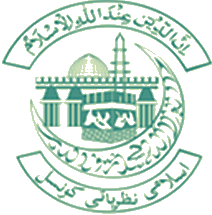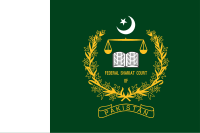
The Politics of Pakistan takes place within the framework established by the constitution. The country is a federal parliamentary republic in which provincial governments enjoy a high degree of autonomy and residuary powers. Executive power is vested with the national cabinet which is headed by Prime Minister of Pakistan, who works with the bicameral parliament and the judiciary. Stipulations set by the constitution provide a delicate check and balance of sharing powers between executive, legislative, and judicial branches of the government.

Muhammad Zia-ul-Haq was a Pakistani military officer who served as the 6th president of Pakistan from 1978 until his death in 1988. He rose to prominence after leading a coup on 5 July 1977, which overthrew the democratically elected government of prime minister Zulfikar Ali Bhutto. Zia subsequently imposed martial law, suspended the constitution, and served as chief martial law administrator before assuming the presidency. Zia served as the 2nd chief of the Army Staff from 1976 to 1988, a position he later leveraged to execute a coup in 1977, which was the second coup in Pakistan's history of coups; the first occurred in 1958 under Ayub Khan.

Freedom of religion in Pakistan is formally guaranteed by the Constitution of Pakistan for individuals of various religions and religious sects.

The Hudud Ordinances are laws in Pakistan enacted in 1979 as part of the Islamization of Pakistan by Muhammad Zia-ul-Haq, the sixth president of Pakistan. It replaced parts of the British-era Pakistan Penal Code, adding new criminal offences of adultery and fornication, and new punishments of whipping, amputation, and stoning to death. After much controversy and criticism parts of the law were extensively revised in 2006 by the Women's Protection Bill.
Islamization or Shariazation, has a long history in Pakistan since the 1950s, but it became the primary policy, or "centerpiece" of the government of General Muhammad Zia-ul-Haq, the ruler of Pakistan from 1977 until his death in 1988.

Sheikh Anwarul Haq, was a Pakistani jurist and an academic who served as the 9th Chief Justice of Pakistan from 23 September 1977 until resigning on 25 March 1981. He signed the death warrant for former Prime Minister Zulfikar Ali Bhutto in a controversial murder case. Bhutto was executed on April 4, 1979.

The judiciary of Pakistan is the national system of courts that maintains the law and order in the Islamic Republic of Pakistan. Pakistan uses a common law system, which was introduced during the colonial era, influenced by local medieval judicial systems based on religious and cultural practices. The Constitution of Pakistan lays down the fundamentals and working of the Pakistani judiciary.

The chief justice of the Federal Shariat Court of Pakistan heads the Federal Shariat Court of Pakistan. The chief justice of the Shariat Court is the second-highest judicial office in the country, after the chief justice of Pakistan.

Council of Islamic Ideology (CII; is a constitutional body of Pakistan, responsible for giving legal advice on Islamic issues to the government and the Parliament.
The Women's Protection Bill which was passed by the National Assembly of Pakistan on 15 November 2006 is an attempt to amend the heavily criticised 1979 Hudood Ordinance laws which govern the punishment for rape and adultery in Pakistan. Critics of the Hudood Ordinance alleged that it made it exceptionally difficult and dangerous to prove an allegation of rape, and thousands of women had been imprisoned as a result of the bill. The bill returned a number of offences from the Zina Ordinance to the Pakistan Penal Code, where they had been before 1979, and created an entirely new set of procedures governing the prosecution of the offences of adultery and fornication. Whipping and amputation were removed as punishments. The law meant women would not be jailed if they were unable to prove rape and their complaints of rape would not be seen as confession of adultery.

Syed Afzal Haider was a Pakistani legal figure who was the caretaker Law, Justice, and Parliamentary Affairs minister. He was also an author of several books.
The law of Pakistan is the law and legal system existing in the Islamic Republic of Pakistan. Pakistani law is based upon the legal system of British India; thus ultimately on the common law of England and Wales.

Muhammad Zia-ul-Haq's dictatorship after assuming the position of sixth president of Pakistan began on 16 September 1978 and ended with his death in an aircraft crash on 17 August 1988. Zia came to power after a coup, overthrowing prime minister Zulfikar Ali Bhutto and imposing martial law in 1977.
Mahmood Ahmad Ghazi was a Pakistani jurist and scholar of Islamic Studies, shariah and fiqh. He was a professor at the International Islamic University, Islamabad, judge at the Federal Shariat Court and Federal Minister for Religious Affairs in Pakistan. He completed his dars-e-nizami at the age of 16 and later obtained a PhD in Islamic Studies from Punjab University. He was fluent in Urdu, English, Arabic, Persian, Turkish and French. He authored numerous works in Urdu and English, and translated Persian poetry Payam-e-Mashriq of Muhammad Iqbal into Arabic.

The economic policies proposed under the banner of "Islamisation" in Pakistan include executive decrees on Zakāt (poor-due), Ushr (tithe), judicial changes that helped to halt land redistribution to the poor, and perhaps most importantly, elimination of riba. Perhaps the foremost exponent of Islamisation among Pakistan's rulers—General Muhammad Zia-ul-Haq—advanced a programme in 1978 to bring Pakistan law in line with the principles of Sharia law.

The History of the Supreme Court of Pakistan, organised by the Chief Justice of Pakistan, follows from its constitutional establishment in 1947 till its recent events. The Supreme Court of Pakistan is the highest appellate court of the country and court of last resort— the final arbiter of the law and the Constitution.

Iqbal Hameedur Rahman, is the current Chief Justice of the Federal Shariat Court. Before that he was a senior justice of the Supreme Court of Pakistan. He is of Bengali origin and born in Dacca, East Pakistan. He served as the Justice of the Supreme Court of Pakistan, as appointed in this post on 24 February 2013 and voluntarily tendered his resignation on 24 October 2016.
The legislative assembly of Pakistan has enacted several measures designed to give women more power in the areas of family, inheritance, revenue, civil, and criminal laws. These measures are an attempt to safeguard women's rights to freedom of speech and expression without gender discrimination. These measures are enacted keeping in mind the principles described by the Quran.
The Safia Bibi rape case involved the rape of a nearly blind teenaged girl named Safia Bibi in 1982 by her employers, in Sahiwal, Pakistan. When she was unable to prove the rape in court, she herself was charged with fornication under Pakistan's Sharia inspired Hudood Ordinances and sentenced to 3 years in jail, 15 canings and a fine.

Justice Dr.Syed Muhammad Anwer was appointed as Judge Federal Shariat Court of Pakistan on 21.05.2020. He took oath as Acting Chief Justice Federal Shariat Court of Pakistan on 16.05.2022. Syed Muhammad Anwer was elevated as Aalim Judge in Federal Shariat Court on 10 July 2023, by the President of Pakistan Dr. Arif Alvi via Notification dated 5 July 2023.















